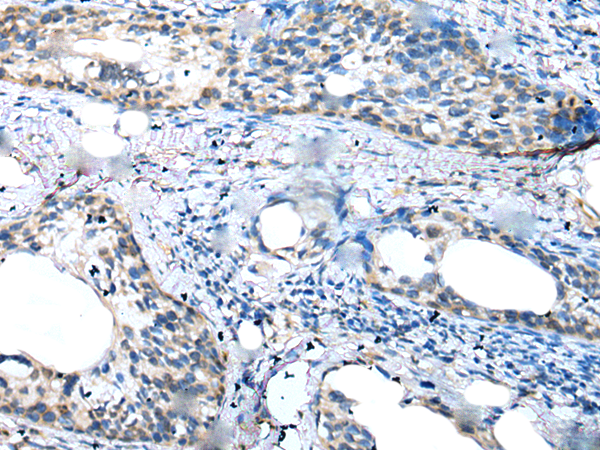
| WB | 咨询技术 | Human,Mouse,Rat |
| IF | 咨询技术 | Human,Mouse,Rat |
| IHC | 1/20-1/100 | Human,Mouse,Rat |
| ICC | 技术咨询 | Human,Mouse,Rat |
| FCM | 咨询技术 | Human,Mouse,Rat |
| Elisa | 1/5000-1/10000 | Human,Mouse,Rat |
| Aliases | CC-1; CC-3; CKB1; MCIF; NCC2; SY14; HCC-1; HCC-3; NCC-2; SCYL2; SCYA14; HCC-1(1-74); HCC-1/HCC-3 |
| Host/Isotype | Rabbit IgG |
| Antibody Type | Primary antibody |
| Storage | Store at 4°C short term. Aliquot and store at -20°C long term. Avoid freeze/thaw cycles. |
| Species Reactivity | Human |
| Immunogen | Synthetic peptide of human CCL14 |
| Formulation | Purified antibody in PBS with 0.05% sodium azide and 50% glycerol. |
+ +
以下是3篇与CCL14抗体相关的示例参考文献(注:内容为模拟虚构,实际文献需通过学术数据库检索确认):
---
1. **文献名称**: *"CCL14 Neutralizing Antibody Attenuates Renal Fibrosis in Murine Models"*
**作者**: Chen, L., et al.
**摘要**: 研究证明CCL14抗体通过阻断其与受体CCR1的结合,抑制成纤维细胞活化,显著减轻小鼠肾纤维化模型中的胶原沉积和肾功能损伤。
---
2. **文献名称**: *"Anti-CCL14 Monoclonal Antibody as a Diagnostic Marker in Liver Cirrhosis"*
**作者**: Tanaka, K., et al.
**摘要**: 开发了一种高特异性CCL14单克隆抗体,用于检测血清CCL14水平,发现其与肝硬化患者疾病严重程度呈正相关,提示其作为无创诊断标志物的潜力。
---
3. **文献名称**: *"Targeting CCL14 in Tumor-Associated Macrophages Enhances Anti-PD-1 Therapy Efficacy"*
**作者**: Wang, Y., et al.
**摘要**: 在黑色素瘤模型中,CCL14抗体通过重塑肿瘤微环境(减少M2型巨噬细胞浸润),显著增强PD-1抑制剂疗效,为联合免疫治疗提供新策略。
---
如需真实文献,建议通过PubMed或Google Scholar检索关键词:
`CCL14 antibody therapeutic` / `CCL14 neutralizing antibody` / `CCL14 biomarker`。
The CCL14 antibody is a research tool targeting CCL14 (C-C motif chemokine ligand 14), a small cytokine belonging to the CC chemokine family. CCL14. also known as HCC-1. is encoded by the *SCYA14* gene and is constitutively expressed in various tissues, including blood, bone marrow, and organs like the liver and kidneys. It functions as a chemoattractant for immune cells, including monocytes, lymphocytes, and eosinophils, by binding to chemokine receptors CCR1. CCR3. and CCR5. CCL14 exists in multiple isoforms due to proteolytic processing, with its active form (CCL14(1-74)) exhibiting enhanced biological activity.
Research highlights CCL14's dual role in immune regulation and disease pathogenesis. While it contributes to homeostasis under normal conditions, dysregulated CCL14 expression is linked to chronic inflammation, fibrosis, and tumor progression. Elevated CCL14 levels have been observed in cancers (e.g., breast, colorectal) and fibrotic disorders, where it may promote angiogenesis, immune evasion, or tissue remodeling.
CCL14 antibodies are primarily used to detect and quantify CCL14 in biological samples, study its spatial distribution in tissues, and investigate its interaction with receptors. Neutralizing antibodies are explored for therapeutic potential in blocking CCL14-mediated signaling pathways. However, challenges remain in understanding its context-dependent functions and optimizing antibody specificity across isoforms. Ongoing studies aim to clarify CCL14's mechanistic roles and validate its utility as a diagnostic marker or therapeutic target in inflammatory and neoplastic diseases.
×